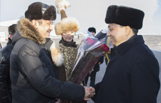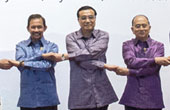Abe's revisionism alienating Japan from neighbors
(Xinhua) Updated: 2014-12-24 15:32For sure, amending the Constitution is different as it needs a referendum.
Along with the revision of the constitution, the denial on Japan's wartime atrocities is also a feature of Abe's revisionism and the issue is truly related to Japan's diplomacy, especially with its neighbors, even its key ally, the United States.
By repeatedly paying homage to the notorious Yasukuni Shrine by ministers and lawmakers and efforts in invalidating the Kono Statement and Murayama Statement by government officials and right- wingers, not only enrage victim countries of Japan's aggression, like South Korea and China, but also prompt vigilance in the United States as newspapers there called Abe's historical revisionism "dangerous."
However, it is utterly regrettable that Tokyo has continuously failed to understand or maybe even ignored sincere calls from South Korea and China for Japan to face its past and take full responsibility for the atrocities in World War II rather than continue to stalk the fire of hatred and distrust.
Abe's plan to abandon the country's pacifist stance, which has been the bedrock of Japan's stunning economic successes in the past, will definitely be a drawback to efforts to promote peace and stability in the region.
It is advisable for Tokyo to take the international reactions over its historical revisionism seriously as the unwise move hardly "bring Japan back" but would only taint Japan's reputation as a peace-loving country and may even alienate the country away from its neighbors.
Next year marks the 70th anniversary of the end of WW II and the world will see, by issuing a new statement, whether Abe could take advantage of the opportunity to express his country's intention to mend ties with neighbors or continue to wage the banner proclaiming Japan's intention to bring back its so-called " glories" in the 1930s.






